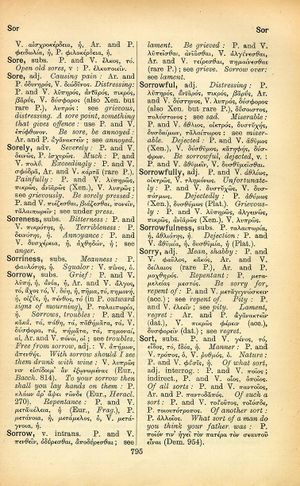sorrow
Οὐκ ἔστι σιγᾶν αἰσχρόν, ἀλλ' εἰκῆ λαλεῖν → Silere non est turpe, sed frustra loqui → nicht Schweigen schändet, sondern Schwätzen auf gut Glück
English > Greek (Woodhouse)
subs.
Grief: P. and V. λυπή, ἡ, ἀνία, ἡ, Ar. and V. ἄλγος, τό, ἄχος, τό, V. δύη, ἡ, πῆμα, τό, πημονή, ἡ, οἰζύς, ἡ, πένθος, τό (in P. outward signs of mourning), P. ταλαιπωρία, ἡ.
Sorrows, troubles: P. and V. κακά, τά, πάθη, τά, παθήματα, τά, V. δύσφορα, τά, πήματα, τά, πημοναί, αἱ, Ar. and V. πόνοι, οἱ; see troubles.
Free from sorrow, adj.: V. ἀπήμων, ἀπενθής.
With sorrow should I see them drunk with wine: V λυπρῶς νιν εἰσίδοιμʼ ἂν ἐξῳνωμένας (Eur., Bacch. 814).
To your sorrow then shall you lay hands on them: P. κλάων ἄρʼ ἅψει τῶνδε (Eur., Heracl. 270).
Repentance: P. and V. μεταμέλεια, ἡ (Eur., Frag.), P. μετάνοια, ἡ, μετάμελος, ὁ, V. μετάγνοια, ἡ.
v. intrans.
P. and V. πενθεῖν, ὀδύρεσθαι, ἀποδύρεσθαι; see lament.
Be grieved: P. and V. λυπεῖσθαι, ἀνιᾶσθαι, V. ἀλγύνεσθαι, Ar. and V. τείρεσθαι, πημαίνεσθαι (rare P.); see grieve.
Sorrow over: see lament.

